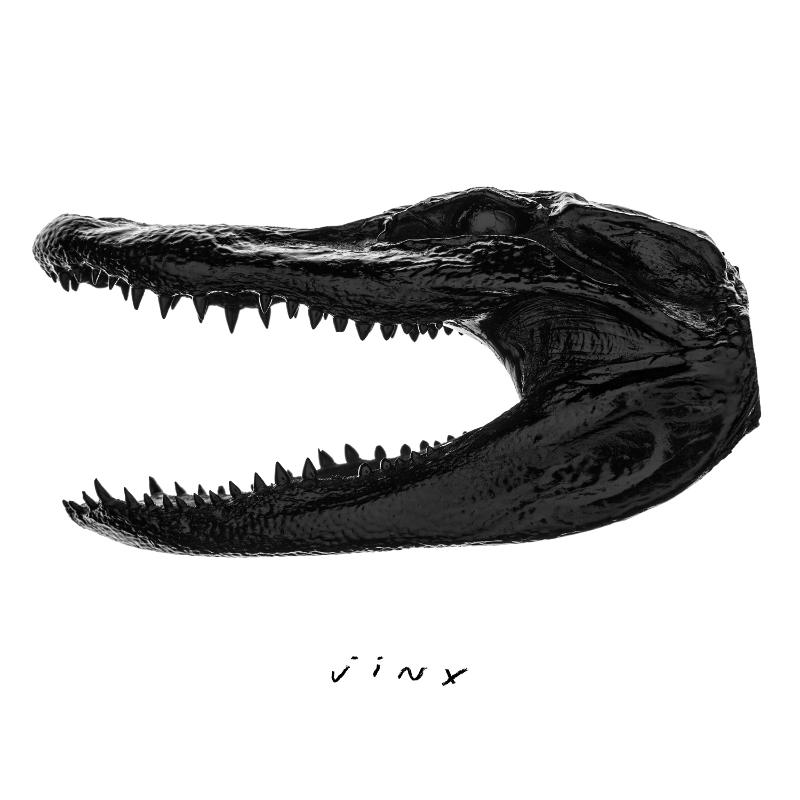San Francisco rockers Weekend like noise – and lots of it. If you give a quick listen to their 2010 debut record, Sports, you’ll immediately be greeted with towers of gushing distortion and thundering waves of dense percussion. Though far from being some heaving mass of undifferentiated sound, the band actually managed to impart some semblance of individuality into the record, allowing it to expand and contract in continuous rhythmic expulsions. Their 2011 follow-up, the five-track EP Red, found the band pulling back a bit on the noise and relying far more on melodic reconstruction and a grizzled dream pop aesthetic. It was far less abrasive than many of the songs on Sports and showed a band in a state of transition. Now it wasn’t always clear what the band was transitioning to at the time. But there was a feeling of sustained movement, and that is exactly what the band needed after the release of their impressive, though somewhat insular, debut.
On their sophomore LP Jinx, this forward momentum has carried them deep into the goth-stadium settings of musical ancestors like The Cure and Depeche Mode. It’s an easy comparison to make, sure, but it’s an apt one and shows the band proudly flying their new wave flag for all to see. But for every reference we conspicuously spot – a dark synth roll here or a throbbing bass line there – it’s the less obvious detours that the band takes through this well-mined genre that really makes the record stand out. On opening track “Mirror,” the band plows through leagues of Disintegration-era distortion-pop and drench everything in a viscous oil slick of noise-rock and gauzy dream pop tendencies. There is a sense of tangled freneticism that keeps the song constantly shifting from one sound to the next with barely a breath taken.
After the dense catharsis of Sports and the melodic experiments on Red, the band has settled into an almost comfortable position, where the jagged serrations of their earlier work blends almost seamlessly with the deliberate melodicism of their most hummable harmonies. Tracks like “July” and “Celebration, FL” find the band dropping the hiss and grit to give their songwriting chops a chance to air out, and far from alienating any of their potential listeners, this restraint actually lends the band a renewed sense of innovation and originality. They’re still playing with the same toys, but the strides they’ve made in knowing why these sounds work so well together really highlight how Weekend have grown since the release of their first record.
And it’s not simply that the songs on Jinx sound clearer and cleaner than their previous work – though that is definitely the case – it seems more to be an issue that the band has a better understanding of how everything should sound, as opposed to how they think their fans expect it to sound. I’m not saying that they ceded any creative license on their earlier records just to cater to any perceived expectations, but at times, it certainly came across as a deliberate aesthetic choice. Here it seems more the natural progression of a band comfortable within their own skins and anxious to show their fans exactly what kind of noise-soaked mischief they can get themselves into.
The back half of the record does feel a bit more narcotized than the beginning, but it’s more shoegaze-meets-post-rock than creative lethargy, though it also holds more than few nods to the band’s occasionally murky pop predilections. It’s a different sense of momentum – less directly forward and more determinedly inward. And while you do occasionally miss the jagged guitar riffs that spilled out in torrents on their previous records (and on the first half of Jinx), the band makes up for it by developing a more attenuated sense of rhythm and melody. Whether it’s the post-industrial motions of “It’s Alright” or the Echo and the Bunnymen-influenced “Scream Queen,” they’ve tapped into a more cohesive set of musical tendencies. It’s no longer enough just to borrow liberally from the jangly goth-pop of the 80s, the band’s own personality has to come through clearly — and it does.
Weekend have expanded their musical palette and aren’t satisfied to simply rehash the past, either their own or their influences. Granted, as they’ve smoothed out the rough edges a bit, some of the rugged immediacy has been lost, but they’ve more than make up for it in a newfound sense of lively rhythmic interaction. Whether they’re staring out at the constantly shifting world around them or simply focusing on the sound of their own languid pulse, the band never settles for creative stoicism. Jinx is a fascinating document of a band in continual motion – even as they expand on their own complicated aesthetic, submerging themselves completely in the surging guitar lines and low-end turbulence that wash across these songs.

